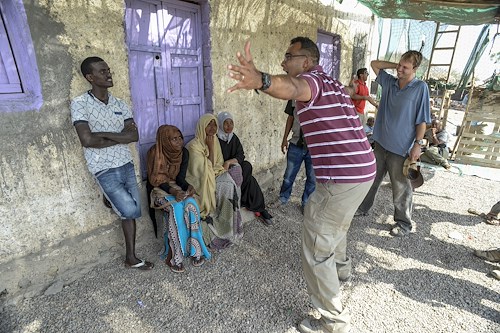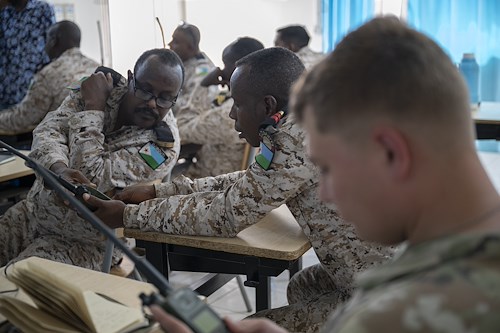Gallery contains 9 images
×
Photo 1 of 9
Civil Affairs Soldiers aid Animal Health
U.S. Army Sgt. Gregory Williams, civil affairs, and Matt Hahn, International Development and Relief Board (IDRB,) explain a scene to the cast of “Ahmed the Herder” before the video shoot in a village near Tadjourah, Djibouti, Dec. 15, 2016. “Ahmed the Herder” is a video series that teaches best practices in animal health care, and is facilitated by U.S. Army civil affairs personnel for the IDRB. (U.S. Air National Guard photo by Staff Sgt. Christian Jadot)
Photo by: Staff Sgt. Christian Jadot
Photo 2 of 9
Civil Affairs Soldiers aid Animal Health
U.S. Army Sgt. Gregory Williams, civil affairs, and Matt Hahn, International Development and Relief Board (IDRB,) explain a scene to the cast of “Ahmed the Herder” before beginning a video shoot in a village near Tadjourah, Djibouti, Dec. 15, 2016. “Ahmed the Herder” is a video series that teaches best practices in animal care, and is facilitated by U.S. Army Civil Affairs personnel for the IDRB. (U.S. Air National Guard photo by Staff Sgt. Christian Jadot)
Photo by: Staff Sgt. Christian Jadot
Photo 3 of 9
Civil Affairs Soldiers aid Animal Health
U.S. Army Sgt. Sarah Dearcy, civil affairs medic, converses with cast members of “Ahmed the Herder,” as a scene is acted out in a village near Tadjourah, Djibouti, Dec. 15, 2016. Civil Affairs personnel helped facilitate production of the video series for the International Development and Relief Board to help educate rural East African farmers and herders on modern animal health care practices. (U.S. Air National Guard photo by Staff Sgt. Christian Jadot)
Photo by: Staff Sgt. Christian Jadot
Photo 4 of 9
Civil Affairs Soldiers aid Animal Health
The cast of “Ahmed the Herder” and a local clan leader rehearse an upcoming scene in a village near Tadjourah, Djibouti, Dec. 15, 2016. “Ahmed the Herder” is a video series that teaches best practices in animal health care, and is facilitated by U.S. Army civil affairs personnel for the International Development and Relief Board. (U.S. Air National Guard photo by Staff Sgt. Christian Jadot)
Photo by: Staff Sgt. Christian Jadot
Photo 5 of 9
Civil Affairs Soldiers aid Animal Health
U.S. Army Sgt. Gregory Williams, civil affairs, and a local clan leader share tea while discussing the International Development and Relief Board (IDRB) video being produced in a village near Tadjourah, Djibouti, Dec. 15, 2016. “Ahmed the Herder” is a video series that teaches best practices in animal care, and is facilitated by U.S. Army Civil Affairs personnel for the IDRB. U.S. Army Civil Affairs teams identify critical requirements needed by local citizens while fostering and maintaining dialogue with civilian aid agencies and assistance organizations. (U.S. Air National Guard photo by Staff Sgt. Christian Jadot)
Photo by: Staff Sgt. Christian Jadot
Photo 6 of 9
Civil Affairs Soldiers aid Animal Health
U.S. Army Capt. Kika Straub, civil affairs veterinary field officer, and U.S. Army Sgt. Sarah Dearcy, civil affairs medical specialist, examine a young goat in a village near Tadjourah, Djibouti, Dec. 15, 2016. U.S. Army Civil Affairs teams identify critical requirements needed by local citizens while fostering and maintaining dialogue with civilian aid agencies and assistance organizations. (U.S. Air National Guard photo by Staff Sgt. Christian Jadot)
Photo by: Staff Sgt. Christian Jadot
Photo 7 of 9
Civil Affairs Soldiers aid Animal Health
U.S. Army Civil Affairs personnel and members of the International Development and Relief Board travel to a remote village to screen the video series “Ahmed the Herder” in the mountains of Djibouti, Dec. 15, 2016. U.S. Army Civil Affairs teams identify critical requirements needed by local citizens while fostering and maintaining dialogue with civilian aid agencies and assistance organizations. (U.S. Air National Guard photo by Staff Sgt. Christian Jadot)
Photo by: Staff Sgt. Christian Jadot
Photo 8 of 9
Civil Affairs Soldiers aid Animal Health
U.S. Army Sgt. Sarah Dearcy, civil affairs medic, examines a baby with an upper respiratory infection in a village near Tadjourah, Djibouti, Dec. 15, 2016. U.S. Army Civil Affairs teams identify critical requirements needed by local citizens while fostering and maintaining dialogue with civilian aid agencies and assistance organizations. (U.S. Air National Guard photo by Staff Sgt. Christian Jadot)
Photo by: Staff Sgt. Christian Jadot
Photo 9 of 9
Civil Affairs Soldiers aid Animal Health
U.S. Army Sgt. Gregory Williams, civil affairs, and Matt Hahn, International Development and Relief Board (IDRB,) screen the video series “Ahmed the Herder” in a village in the mountains of Djibouti near Tadjourah, Dec. 15, 2016. “Ahmed the Herder” is a video series that teaches best practices in animal care, and is facilitated by U.S. Army Civil Affairs personnel for the IDRB. (U.S. Air National Guard photo by Staff Sgt. Christian Jadot)
Photo by: Staff Sgt. Christian Jadot
TADJOURAH, DJIBOUTI- U.S. Army Civil Affairs personnel teamed up with the International Development and Relief Board (IDRB) to produce a series of educational videos on the subject of animal health in a village near Tadjourah Dec. 15, 2016.
Matt Hahn with the IDRB developed the concept and stories for the video series “Ahmed the Herder,” while U.S. Army Reservist Staff Sgt. Gregory Williams, helped facilitate the production of the video. “Ahmed the Herder” is a video series produced by the IDRB which tells a comical story of the goat herder Ahmed, while relaying an educational message of how to care for the health and well being of livestock animals. Thus far, the videos have targeted the Afar population in the Horn of Africa.
“It has been our vision for the last three years to record simple videos for the Afar people that would help them understand concepts about the health of their animals, but also basic concepts about health and life [in East Africa],” said Hahn. “We have recorded five videos with a whole cast of local folks, who at the beginning had no training in acting, and worked through guiding them on how to make a movie and how to act for the camera. We also made the educational section in the videos simple enough that anybody across the country side can understand it.”
Staff Sgt. Williams is a drill status guardsman for the New York National Guard deployed to Djibouti. In his civilian career he works both in front of the camera as a freelance actor, and behind it as a camera operator for Fox News. He coordinated with the IDRB, and facilitated the production of “Ahmed the Herder.”
“The purpose of working with IDRB-Djibouti in making these animal care instruction videos is to educate local animal owners in best practices for animal care management while enhancing our sphere of influence with local leaders and the villagers themselves,” said Staff Sgt. Williams. “As [civil affairs] Soldiers, I feel it's one of our duties to assist the [local] government and its people, so producing comedic educational videos is a way to kill two birds with one stone. We get to engage with key leaders anywhere we want, and the people get a video series that's not only entertaining, but is useful in gaining knowledge on animal care management.”
The IDRB started engaging in relief work during the humanitarian crisis in Somalia, and has since expanded its efforts throughout the Horn of Africa. IDRB members seek to establish developmental practices focused on the needs of the populace in their assigned region.
“Throughout the countryside for the last 20 years we have been doing animal health clinics and treating the livestock,” Hahn said. “We have begun to realize that the animal owners lack basic education on what could be done very simply to help their animals thrive and be healthier.”
Animal herds in the region suffer from numerous issues including parasites and poor nutrition due to the lack of available food, baboon attacks, and little or no access to animal health workers.
“By informing the people on how to better take care of their herds, we hope to see an increase in the production of milk and quality of meat result from the health of the livestock,” Staff Sgt. Williams said. “By us recording and showing these videos in the countryside, we're reaching out to villagers that live in the more rural areas of the country who wouldn't typically know how to properly manage their herds.”
The U.S. Army Civil Affairs efforts to facilitate the video series has helped to form a positive impression of the U.S. military with the local population.
“The more we shoot and produce these videos, the more we show the Djiboutians that we care about their country's future,” said Staff Sgt. Williams. “Through shooting these videos, my team has become friends with clan leaders who haven't interacted with U.S. forces; and like people always say, always make a good first impression. We've shown the videos to local government leaders. They're very happy with what we're doing for their people, and it’s always great to feel appreciated.”
The IDRB works with the Ministry of Agriculture in Djibouti to help bring the knowledge of animal healthcare to most of the regions in the country.
“We don’t believe that everybody has to leave the countryside to go to a city for a better life, we help the [rural] folks to excel with the resources they have,” Hahn said. “I would like to see the Afar people begin to really think about the practices they actually do with their animals and evaluate them. If their animals aren’t thriving, hopefully we will change their practices.”
With the assistance of civil affairs personnel, the IDRB has visited several remote villages to build relationships with the local people, and assess how they can help to make Djibouti a more prosperous country.
According to Hahn, the rural Djiboutian population has repeatedly demonstrated overwhelming accommodation and generosity. “The Afar people are some of the most welcoming people you will ever meet,” Hahn said.































